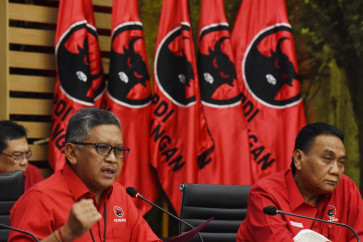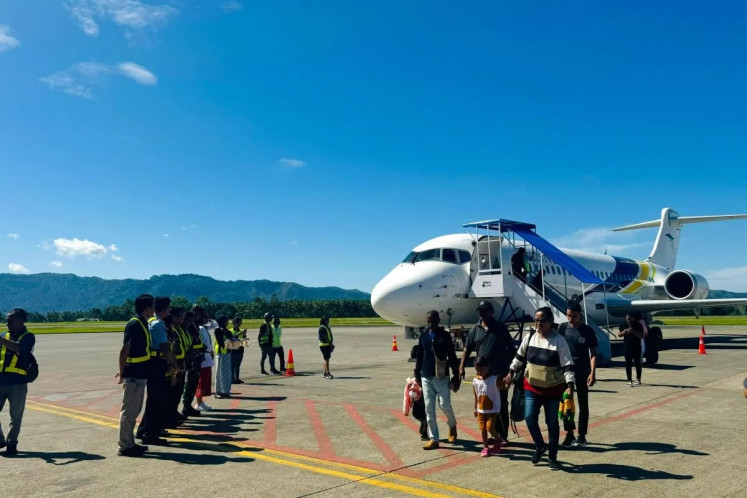Questions loom over 1-billion tree planting program
The environment is one of the hottest global issues in the world, including in Indonesia where there are growing concerns over the loss of its forests, which threatens its rich biodiversity
Change Size

T
he environment is one of the hottest global issues in the world, including in Indonesia where there are growing concerns over the loss of its forests, which threatens its rich biodiversity.
Illegal logging, mining activities and land use conversion, including for the expansion of oil palm plantations, have destroyed much of the forests and their ecosystems, bringing many species to the brink of extinction.
Not only do forests provide various environmental services and support the livelihoods of many people, they also serve as carbon sinks. The loss of forests means a declining capacity to absorb emissions, which has become a crucial global problem.
In an effort to reduce greenhouse emissions from the forestry sector, the government is introducing a campaign to plant one billion trees this year.
Forestry Minister Zulkifli Hasan has said his office would allocate 500,000 hectares of land to plant about 500 million trees financed by the state budget. The remainder of the target will be shared among industrial forest concessionaires and private companies.
In a hearing with the House of Representatives last month, he said that the allocation of funds from the 2010 state budget for the tree planting program would be enough to plant only 100 million trees. The estimated cost of cultivating and planting one tree is Rp 5,000 (about 52 US cent).
According to the minister, a number of big firms, including mining and cigarette companies, have committed to joining the program. The target is to obtain Rp 2.5 trillion from the private companies for the planting of 500 million trees.
The campaign is a follow up to President Bambang Susilo Yudhoyono's pledge to cut emissions from energy and forestry by 26 percent by 2020. According to the President, the target is achievable because most of the country's emissions come from forest-related activities, such as those leading to forest fires and deforestation.
Indonesia is the world's third largest forest nation after Brazil and the Republic of Congo. Officially it has about 130 million hectares of forest, but only 43 million hectares are in good condition while 40 million hectares are totally damaged. Zulkifli said that the remaining 48 million hectares are log over areas, which are critical due to forest exploitation through the logging concession system.
Sumatra has suffered the most damage, followed by Kalimantan. Much of the forests in Papua and Maluku have also been destroyed.
The country has the highest rate of deforestation and forest degradation at more than one million hectares per year. Another disheartening fact is that it is the world's third biggest emitter of greenhouse gases, with emissions from forestry and peatland accounting for approximately 80 percent of its emissions.
The government will make the ambitious one-billion tree planting program part of the Reducing Emission from Deforestation and Forest Degradation (REDD) plus scheme to mitigate climate change, which will allow Indonesia and the companies to get financial benefits from the carbon offset.
In anticipation of the program implementation, the Forestry Ministry has announced a plan to include oil palm plantations in the forestry sector.
However, experts warn that trees that are planted in industrial forests grow fast and have a short lifespan. When they are cut down, they will produce emissions. Eventually the forest will end up being a net emitter instead of net carbon sink.
Therefore, the government should discard the plan to include oil palm plantations in the forestry sector and companies must manage the existing plantations under sustainable principles.
In order to reduce emissions, the roots of the problem must be addressed. It is necessary to restore the damaged forests and protect the remaining forests. Strict measures should be undertaken to stop illegal logging and destructive mining activities.
Last week, President Yudhoyono stated his environmental commitment before receiving a US$1 billion grant from Norway to reduce deforestation.
He pledged to impose a two-year moratorium on clearing activities in virgin forests and peatlands. Existing oil palm plantation contracts will be exempt from the moratorium, but they should use degraded land instead of clearing forests.
Many have praised the President's move and are impressed by his commitment, but the most important things are implementation and supervision. The government has to take strict action against illegal exploitation.
In a country with poor legal enforcement where money talks, the effectiveness of the President's pledge remains to be seen. As for the one-billion tree planting program, the government should also make great efforts to bring it to success.
Past experience demonstrates how the government's tree planting programs usually fail. The forestry minister has acknowledged the failures, saying that the activities could not be verified because they were planted by the public in their own areas.
He said, however, that under the one-billion tree planting program, all planted trees must be measured, reported and verified.
This may be easier said than done. It is good to plant trees but without proper planning, problems will hinder its implementation. After the trees are planted, who will take care of them? Besides good planning and public participation, transparency is a must, especially taking into account that the program involves a lot of money and the fact that Indonesia is one of the most corrupt countries in the world.









